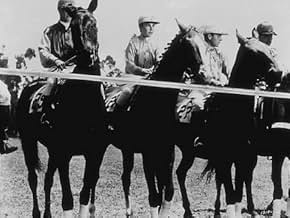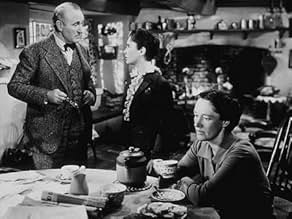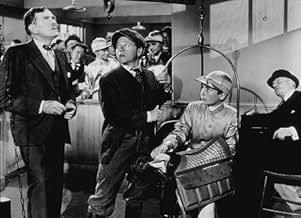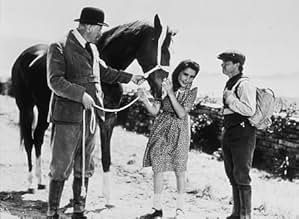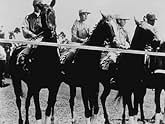IMDb RATING
7.3/10
8.6K
YOUR RATING
A jaded former jockey helps a young girl prepare a wild but gifted horse for England's Grand National Sweepstakes.A jaded former jockey helps a young girl prepare a wild but gifted horse for England's Grand National Sweepstakes.A jaded former jockey helps a young girl prepare a wild but gifted horse for England's Grand National Sweepstakes.
- Won 2 Oscars
- 6 wins & 5 nominations total
Jackie 'Butch' Jenkins
- Donald Brown
- (as Jackie Jenkins)
Featured reviews
A sentimental, heart-tugging family film set in England of the 1920s. A young Elizabeth Taylor wins a horse in a raffle and decides to enter him in the Grand National; fortunately, ex-jockey Mickey Rooney is around to give Liz some help. Director Clarence Brown displays some remarkable control with material that could've been excessively maudlin in someone else's hands. He and screenwriters Helen Deutsch and Theodore Reeves take great care in establishing genuine characterizations and developing the story naturally. True, there are one or two scenes that seem a bit forced, but overall it's quite affecting, and gorgeously filmed in Technicolor. The race itself is quite thrilling, and like so many great classics, there's a marvelous, three-hankie fade-out at the end. Liz proves that she was a real trooper right from the start, and Rooney--who I usually find rather annoying--is surprisingly subdued and really very good. Donald Crisp is terrif as Liz's gruff father and Angela Lansbury is a delight as her older, boy-crazy sister. Most of the acting kudos, however, belong to Anne Revere, who won a richly deserved Supporting Actress Oscar playing Liz's wise and caring mother.
One of the enduring classics from MGM came out in the closing years of World War II, it's the film that made young Elizabeth Taylor a star. She had done a few films as a child actress before National Velvet, but when it came out her place in the movies was assured. Ironically enough biologically she'd be growing up fast enough after National Velvet was out and her next struggle as an actress was to get substantial adult roles because casting directors only saw her as innocent little Velvet Brown who loved her jumping horse.
I'm not sure of how this would work because steeplechase horses have to have confirmed bloodlines and the Pi's are a subject not dealt with in National Velvet. All we know is that he's a reckless and untrainable horse in the hands of Reginald Owen and after he breaks free and causes considerable damage, Owen gets rid of him for a nominal price to the local butcher Donald Crisp.
At the same time as these things are happening, Mickey Rooney comes wandering into the lives of the Brown family which consists of Crisp, wife Anne Revere, and daughters Angela Lansbury, Juanita Quigley, and Elizabeth Taylor and their little brother Butch Jenkins. Rooney is a former jockey who's now on the open road and heading for the Brown family where his father was once a horse trainer for Anne Revere's family. It's he who sees the potential of the Pi (short for pirate) as a steeplechase jumper and it's Elizabeth who convinces Crisp not to pass up this chance.
Elizabeth Taylor was so sweet and innocent in National Velvet. The Good Book says you have to have faith like a child and she has it to spare. She infuses Rooney with it, to have faith in the heart and ability of the Pi and to leave a little over for himself.
Anne Revere won a Best Supporting Actress Award for National Velvet. She's a very wise mother who has hidden depths to her that the audience doesn't suspect. It turns out that back in her youth she had a taste of fame and glory swimming the English Channel and her prize money, saved all these years, she gives to her daughter. That scene is probably what won her the Oscar. National Velvet also won one other Academy Award, for Film Editing.
Over 60 years after it made its debut National Velvet as a family classic hasn't lost a thing. Its depiction of life between the World Wars in Great Britain is still a standout. And National Velvet launched a movie legend. Can't do much better than that for high regard.
I'm not sure of how this would work because steeplechase horses have to have confirmed bloodlines and the Pi's are a subject not dealt with in National Velvet. All we know is that he's a reckless and untrainable horse in the hands of Reginald Owen and after he breaks free and causes considerable damage, Owen gets rid of him for a nominal price to the local butcher Donald Crisp.
At the same time as these things are happening, Mickey Rooney comes wandering into the lives of the Brown family which consists of Crisp, wife Anne Revere, and daughters Angela Lansbury, Juanita Quigley, and Elizabeth Taylor and their little brother Butch Jenkins. Rooney is a former jockey who's now on the open road and heading for the Brown family where his father was once a horse trainer for Anne Revere's family. It's he who sees the potential of the Pi (short for pirate) as a steeplechase jumper and it's Elizabeth who convinces Crisp not to pass up this chance.
Elizabeth Taylor was so sweet and innocent in National Velvet. The Good Book says you have to have faith like a child and she has it to spare. She infuses Rooney with it, to have faith in the heart and ability of the Pi and to leave a little over for himself.
Anne Revere won a Best Supporting Actress Award for National Velvet. She's a very wise mother who has hidden depths to her that the audience doesn't suspect. It turns out that back in her youth she had a taste of fame and glory swimming the English Channel and her prize money, saved all these years, she gives to her daughter. That scene is probably what won her the Oscar. National Velvet also won one other Academy Award, for Film Editing.
Over 60 years after it made its debut National Velvet as a family classic hasn't lost a thing. Its depiction of life between the World Wars in Great Britain is still a standout. And National Velvet launched a movie legend. Can't do much better than that for high regard.
A lot of directors have broached childhood:Truffaut,Bunuel,Pialat,Comencini,Loach ,but no one did it as Clarence Brown used to do:his world is a rosy one ,a protected one where any dream can come true if you believe in it.Not realistic?Not that much :take "the yearling" for instance:the young hero's pal's death is not passed over in silence but Jody did tell him and us that somewhere in Heaven there are prairies full of coypus.In "National Velvet" ,the mother ,quoting the Book of Ecclesiastes ,tells her daughter that there's a time for everything,even a time to die.
Colors display something magic,closer to fairy tales than to a realistic story:this small town,with its colorful characters,its school where the teacher loves all of her students whom she's going to miss during the long holiday,its butcher's shop.The heroine's parents own it and their house suffuses with understanding,tenderness and love.The race is ,as far as Velvet is concerned , entirely implausible ,but it's nicely filmed.
A top-notch cast cannot fail to win over the audience:the couple Anne Revere/Donald Crisp are parents every child dreams of;Elizabeth Taylor has always been an underrated actress,to think that about 20 years later,she would be Martha in "who's afraid of Virginia Woolf?"!;Mickey Rooney 's pouty mouth and sullen expression avoid pathos and melodramatic effects.And there's also a young Angela Landsbury,long before "murder she wrote" ,on the threshold of a brilliant career.
It may not appeal to Today's children ,who got used to special effects and action-packed stories.But for the adults who've still got their child's soul,it's a true delight.
Colors display something magic,closer to fairy tales than to a realistic story:this small town,with its colorful characters,its school where the teacher loves all of her students whom she's going to miss during the long holiday,its butcher's shop.The heroine's parents own it and their house suffuses with understanding,tenderness and love.The race is ,as far as Velvet is concerned , entirely implausible ,but it's nicely filmed.
A top-notch cast cannot fail to win over the audience:the couple Anne Revere/Donald Crisp are parents every child dreams of;Elizabeth Taylor has always been an underrated actress,to think that about 20 years later,she would be Martha in "who's afraid of Virginia Woolf?"!;Mickey Rooney 's pouty mouth and sullen expression avoid pathos and melodramatic effects.And there's also a young Angela Landsbury,long before "murder she wrote" ,on the threshold of a brilliant career.
It may not appeal to Today's children ,who got used to special effects and action-packed stories.But for the adults who've still got their child's soul,it's a true delight.
If you last saw National Velvet with a Saturday matinée serial, for a ticket price of twenty-five cents (including popcorn) -- and you purchased the video to see it again with family -- be prepared to re-experience primal feelings from the early dawn of your history. Warm, wet tears will run down your cheeks. Warm, happy feelings will make you stand up and cheer, as if the posse were galloping to the rescue; but most of all, you will feel good -- it will happen often while viewing National Velvet. See the video many times -- cry and use a handkerchief (remember that piece of cloth mom tucked into your shirt pocket) -- jump up from the sofa and cheer; and FEEL GOOD again -- and again.
National Velvet was initially released in 1944; but I must have seen a re-release soon thereafter -- because I know that I was in grade school at the time. I did not see it again until I bought the DVD for my mother recently. And if asked what the movie was about, during that interim period of more than fifty years, I would have answered -- "it's about a horse." That's a boy's initial and lasting impression.
Animal lovers, (I'm sorry, but) National Velvet is not a horsey movie (and never has been)-- the film is really about the pre-teen innocence and enthusiasm of Velvet Brown (Elizabeth Taylor). No animal -- not the film's sorrel gelding, nor Charlie, my yellow labrador -- can compete with the budding beauty of Elizabeth Taylor for the camera's attention. But, stay focused on Velvet's three interwoven relationships -- with Mi Taylor (Mickey Rooney), with her mother (Anne Revere, best supporting actress Academy Award), and the horse, Pirate ("Pi"). What characterizes winsome Velvet, in these attachments, is a 12-year old's single mindedness of commitment and trust, together with her unwaivering loyalty -- admirable qualities also of Ms. Taylor in real life. Mi, whose father mentored Mrs. Brown, is a young itinerant from less fortunate circumstances, with a working knowledge of jumping horses. Mrs. Brown, ever mindful of her own growing experiences, is especially supportive of both her daughter and Mi. The spirited Pi is difficult handling for its owner, and the horse soon becomes a project for Mi and Velvet.
Angela Lansbury (Velvet's older sister, Edwina, aka TV's Jessica Fletcher fifty years later), Jackie Jenkins (the young brother), and particularly Donald Crisp (Mr. Brown, Velvet's father and village butcher) provide able and entertaining support roles. National Velvet received five Academy nominations, winning two.
Set in the 1920's English coastal village of Sewels and its green pasturelands (on location in Carmel, California), Enid Bagnold's book (1933)and the film (1944) tell us a lot about the moral and social structure of small villages (and our small towns, too). One meaningful scene shows Mrs. Brown stowing money in a kitchen pot on her pantry shelf, while Mi spies from the window -- we are wary of what he might do next. Villagers could be suspicious of strangers but they also extended trust, believing in a person's goodness. Front doors were left open -- grandparents will tell of neighbors regularly walking into an empty house, through the unlatched screen, to borrow a cup of sugar from the same cupboard where family monies were stored (my mother kept petty cash in an unused sugar bowl). Honesty was important, but entrusting friends and neighbors was equally valued. That unlatched screen with open front door was a symbol of our neighborliness and trust, and a more meaningful symbol of the times we lived in -- and yes, maybe it said something about our innocence too.
National Velvet was initially released in 1944; but I must have seen a re-release soon thereafter -- because I know that I was in grade school at the time. I did not see it again until I bought the DVD for my mother recently. And if asked what the movie was about, during that interim period of more than fifty years, I would have answered -- "it's about a horse." That's a boy's initial and lasting impression.
Animal lovers, (I'm sorry, but) National Velvet is not a horsey movie (and never has been)-- the film is really about the pre-teen innocence and enthusiasm of Velvet Brown (Elizabeth Taylor). No animal -- not the film's sorrel gelding, nor Charlie, my yellow labrador -- can compete with the budding beauty of Elizabeth Taylor for the camera's attention. But, stay focused on Velvet's three interwoven relationships -- with Mi Taylor (Mickey Rooney), with her mother (Anne Revere, best supporting actress Academy Award), and the horse, Pirate ("Pi"). What characterizes winsome Velvet, in these attachments, is a 12-year old's single mindedness of commitment and trust, together with her unwaivering loyalty -- admirable qualities also of Ms. Taylor in real life. Mi, whose father mentored Mrs. Brown, is a young itinerant from less fortunate circumstances, with a working knowledge of jumping horses. Mrs. Brown, ever mindful of her own growing experiences, is especially supportive of both her daughter and Mi. The spirited Pi is difficult handling for its owner, and the horse soon becomes a project for Mi and Velvet.
Angela Lansbury (Velvet's older sister, Edwina, aka TV's Jessica Fletcher fifty years later), Jackie Jenkins (the young brother), and particularly Donald Crisp (Mr. Brown, Velvet's father and village butcher) provide able and entertaining support roles. National Velvet received five Academy nominations, winning two.
Set in the 1920's English coastal village of Sewels and its green pasturelands (on location in Carmel, California), Enid Bagnold's book (1933)and the film (1944) tell us a lot about the moral and social structure of small villages (and our small towns, too). One meaningful scene shows Mrs. Brown stowing money in a kitchen pot on her pantry shelf, while Mi spies from the window -- we are wary of what he might do next. Villagers could be suspicious of strangers but they also extended trust, believing in a person's goodness. Front doors were left open -- grandparents will tell of neighbors regularly walking into an empty house, through the unlatched screen, to borrow a cup of sugar from the same cupboard where family monies were stored (my mother kept petty cash in an unused sugar bowl). Honesty was important, but entrusting friends and neighbors was equally valued. That unlatched screen with open front door was a symbol of our neighborliness and trust, and a more meaningful symbol of the times we lived in -- and yes, maybe it said something about our innocence too.
There's a family that enjoys the life it lives (on the south coast on England, late 1920s), that takes in a wayward traveller to give, sustenance and shelter, he becomes the father's helper (delivery boy), and it soon turns out he has much more to give; as he makes a friend of Velvet who desires, and together they combine, devise, conspire, to acquire a race horse (steeplechaser), there's some luck involved of course, although the father is displeased and shows some ire (not for too long though); the said horse is called The Pie and he can fly, jumping obstacles of scale he does not shy, gets a chance to race Grand National, jockey change leads to fantastical, in a beauty of a film, might make you cry.
Discover the nominees, explore red carpet fashion, and cast your ballot!
Did you know
- TriviaMickey Rooney had to film all of his scenes in one month before he had to report for basic training to serve in World War II.
- GoofsThe horses are shown turning right at one point during the race. All turns on the Grand National course are made to the left.
- Quotes
Mrs. Brown: That'll be a dispute to the end of time, Mr. Brown: whether it's better to do the right thing for the wrong reason or the wrong thing for the right reason.
- Crazy creditsA frame, with music, was added to the film at the end: "To families of servicemen and women: Pictures exhibited in this theater are given to the armed forces for showing in combat areas around the world. [signed] War Activities Committee/Motion Picture Industry"
- ConnectionsEdited into The Story of Seabiscuit (1949)
- SoundtracksGreensleeves
(uncredited)
Traditional English folk song
Details
- Runtime
- 2h 3m(123 min)
- Color
- Aspect ratio
- 1.37 : 1
Contribute to this page
Suggest an edit or add missing content


